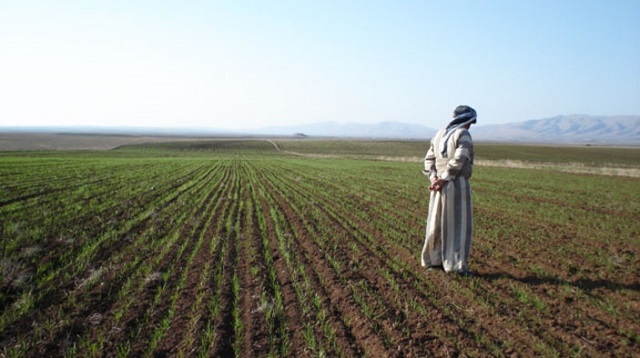Question:
Assalaam Alaikum wa Rahmatullah wa Barakatahu
May Allah grant you His forgiveness and good health,
I have two questions, the first one: It is known that Omar Ibn Al-Khattab (ra) kept the land of Iraq and refused to distribute it to the fighters, the question is: Is this an Ijtihad of Omar Ibn Al-khattab (ra) which others may hold a different Shariah opinion, or is it a consensus of the companions which is prohibited to differ with?
The second question is: land in the Islamic state is either classified as a Kharaj or ‘Ushr.
Kharaj as defined in the book Funds in the Khilafah State as: the right of the Muslims imposed on the land that is conquered from the Kuffar, either by the use of force or by peaceful means, it would thus be a Kharaj of force and a Kharaj of peace. And ‘Ushr is what is taken from the produce of ’Ushri land of a Muslim and it is Zakat and is given for specific categories decided by the Shar’.
The question is: in a land where its inhabitants embraced Islam like Indonesia, the state collects ‘Ushr from the Muslims, and it also taxes the Kaffir who possesses land; what is the name given to the taxes that the state collects from the Kaffir, note that it is not considered from ‘Ushr, and it is not included in the definition of Kharaj?
Please forgive me if I burdened you, Thank you.
From Abu Abdullah Al-Halabi
Answer:
Wa Alaikum Assalaam Wa Ramatullah Wa Barakaatuhu
Your question is of two parts:
The answer to the first part is:
The action taken by Omar Ibn Al-Khattab when he did not divide the land of the Sawad of Iraq among the fighters and made it the responsibility of Bait ul-Mal is not regarded as consensus of the companions, it is the Ijtihad of Omar (ra), many companions agreed with his Ijtihad because he based it on strong evidence. Muslims thereafter followed the opinion of Omar (ra).
As for what to do with the land that are opened by force, this can be in two ways: either they are distributed by the Imam (leader) as what the Prophet صلى الله عليه وسلم did with the land of Khaybar, or to withhold it from the Muslims similar to what Omar Ibn Al-Khattab did later on with the Land of Sawad of Iraq. The leader can follow either one which will bring the benefit for the Muslims.
It was mentioned in the book The Islamic Shakhsiyah Volume II (Arabic version pages 244-245):
“…therefore the land opened by force is the discretion of the Imam, if he wishes he can divide it like the Prophet صلى الله عليه وسلم divided Khaybar, and if he wishes he can leave it in the hands of its owners, and impose Kharaj on it as a fai’ [booty] for the Muslims, as Omar (ra) did with the land of Sawad and Ash-Sham and Egypt; he chooses that which will bring the benefit for the Muslims.”
The answer to the second part of the question:
What is imposed on the Kaffir on an ‘Ushr land cannot be ‘Ushr because ‘Ushr is Zakat, and the Kaffir is not part of those who pay Zakat, so it is neither imposed on him nor accepted from him. Land must have a function, it is either Kharaj or ‘Ushr; since what is imposed on the Kaffir cannot be ‘Ushr therefore it would be Kharaj, the State deals with this money collected from him as it does with Kharaj.
As for why we mentioned that land must have a function, this is because the evidences of the agricultural land mentioned in the Shariah:
- The general evidences, and it obliges Muslims to pay Zakat on it: ‘Ushr (tenth) or half of ‘Ushr
«فِيمَا سَقَتْ الأَنْهَارُ وَالْغَيْمُ الْعُشُورُ، وَفِيمَا سُقِيَ بِالسَّانِيَةِ نِصْفُ الْعُشْرِ»
“… ‘Ushur is on that which is irrigated by rivers and clouds and half of ‘Ushur on what is irrigated by As-Sanniya.” and other evidences.
- After the conquests a new problem emerged on lands which took them out of the general text and Kharaj was imposed on it.
«قَضَى رَسُولُ اللهِ r فِيمَنْ أَسْلَمَ مِنْ أَهْلِ البَحْرَيْنِ أَنَّهُ قَدْ أَحْرَزَ دَمَهُ وَمَالَهُ إِلاَّ أَرْضَهَ، فِإِنَّهَا فَيْءٌ لِلْمُسْلِمِينَ؛ لأَنَّهُمْ لَمْ يُسْلِمُوا وَهُمْ مُمْتَنِعُونَ»
“The Messenger of Allah صلى الله عليه وسلم decided over those who embraced Islam from the people of Bahrain that they had saved their blood and wealth, except their land. Therefore it is a Fay’ (booty) for the Muslims, because they did not embrace Islam while they abstained.”
What Omar (ra) decided on the land of Sawad: “I decided to hold back the land with its men from the Kuffar, and impose the Kharaaj on it…” and other evidences.
- Therefore Zakat is due on all lands in Dar ul-Islam, except for one type, which gives Kharaj.
- The general rule remains general: “A Muslim must pay Zakat on land in Dar ul-Islam” unless it is specified by another text: “Kharaj land”.
- This is the ruling on the agricultural land, had there been no texts related to the Kharaj land then the ruling would be the payment of Zakat on land by it Muslim owner according to the narrated Shariah texts.
- Therefore the rulings on land in Islam is restricted to these two only and not any other type: either it is ‘Ushr or Kharaj; so a ‘Ushr or half a ‘Ushur is paid if it meets the conditions if it was ‘Ushri land; and Kharaj is paid on it if it meets the conditions if it was a Kharaj land.
Your brother,
Ata Bin Khalil Abu Al-Rashtah
8 Rajab 1436 AH
27/4/2015 CE
The link to the answer from the Ameer’s Facebook page:

